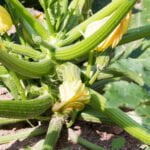Manure plays a vital role in the cultivation of vibrant and productive vegetable gardens. Whether you are an experienced gardener or just starting out, understanding the importance of manure and how to properly utilize it can significantly enhance the health and yield of your plants. In this article, we will explore the various types of manure available for vegetable gardens, the benefits they provide, and essential dos and don’ts for incorporating them into your garden.
Vegetable gardens thrive on nutrient-rich soil, and manure is an excellent source of those nutrients. It contains a wide range of essential elements such as nitrogen, phosphorus, potassium, and organic matter. These nutrients not only promote healthy plant growth but also enhance their ability to resist diseases and pests. Moreover, incorporating manure into the soil helps improve its structure and water retention capacity, ensuring optimal growing conditions for your vegetables.
Before delving into the specifics, it is important to understand what exactly manure is and why it is beneficial for vegetable gardens. Manure refers to animal feces that have decomposed over time. It is packed with valuable nutrients that become readily available to plants once incorporated into the soil.
Additionally, manure is rich in beneficial microorganisms that help break down organic matter, release nutrients slowly over time, and improve soil fertility. However, be cautious as not all types of manure are suitable for all vegetables due to variations in nutrient composition and potential diseases present in different types of animal waste.
Join us as we explore the fascinating world of manure in relation to vegetable gardening. By understanding how to choose the right type of manure for your specific needs, proper handling techniques, best practices for incorporating it into your garden beds without risking plant health or safety concerns associated with pathogens or chemical contaminants sometimes found in fecal matter-the power of manure can be fully harnessed towards cultivating bountiful harvests from your own backyard.
What is Manure and Why is it Beneficial for Vegetable Gardens?
Manure is a naturally occurring substance that comes from animal waste. It is highly beneficial for vegetable gardens due to its rich nutrient content. Manure is an excellent source of organic matter, which helps improve soil structure and enhances the overall health of the garden.
One of the key reasons why manure is beneficial for vegetable gardens is its nutrient content. Manure contains essential nutrients such as nitrogen, phosphorus, and potassium, which are necessary for plant growth and development. These nutrients are released slowly into the soil as the manure decomposes, providing a consistent source of nutrition for plants throughout their growing season.
In addition to providing essential nutrients, manure also improves soil fertility and moisture retention. The organic matter in manure helps to break up heavy clay soils, allowing better drainage and root penetration. It also increases the water-holding capacity of sandy soils, preventing them from drying out too quickly.
Moreover, manure supports beneficial microorganisms in the soil. These microorganisms help to break down organic matter and release additional nutrients that are not readily available to plants. This symbiotic relationship between microorganisms and manure enhances nutrient availability and boosts overall plant health.
| Nutrient | Cow Manure | Chicken Manure | Horse Manure |
|---|---|---|---|
| Nitrogen (N) | 0.5-1% | 1-2% | 0.3-0.6% |
| Phosphorus (P) | 0.3-0.7% | 1-4% | 0.3-1.2% |
| Potassium (K) | 0.3-0.8% | 1-2% | 0.3-1.5% |
When using manure in the garden, it is important to consider the type of manure and its nutrient content. The table above provides some average nutrient values for common types of manure, including cow, chicken, and horse manure. These values can vary depending on factors such as animal diet and age.
Different Types of Manure for Vegetable Gardens
Manure is a valuable resource for vegetable gardens because it provides essential nutrients that can enhance plant growth and yield. However, not all types of manure are created equal. Different animals produce manure with varying nutrient contents, which makes it important for gardeners to understand the differences and choose the right type of manure for their vegetable gardens.
Cow Manure
Cow manure is one of the most commonly used types of manures in vegetable gardens. It is rich in organic matter and contains essential nutrients like nitrogen, phosphorus, and potassium. Cow manure also improves soil structure and water infiltration, making it an excellent choice for improving overall soil fertility.
Chicken Manure
Chicken manure is another popular choice for vegetable gardens due to its high nitrogen content. It is particularly beneficial for leafy vegetables like lettuce and spinach that require large amounts of nitrogen for healthy growth. However, fresh chicken manure can be too potent and may burn plants if not properly composted beforehand.
Horse Manure
Horse manure is often readily available on farms and ranches, making it a convenient option for gardeners. It has a balanced nutrient profile, providing both macro – and micronutrients necessary for plant growth. Horse manure also helps improve soil structure and moisture retention while reducing compaction.
While cow, chicken, and horse manures are some of the most widely used types in vegetable gardens, there are other options available as well. For example, rabbit manure is high in nitrogen but must be composted before use due to its high ammonia content. Sheep or goat manure is also beneficial but should be aged or composted to reduce the risk of weed seeds.
When choosing the type of manure for your vegetable garden, consider factors such as local availability, nutrient content, potential risks (such as pesticide residues), and composting requirements. It may be helpful to conduct a soil test to determine the nutrient deficiencies in your garden and choose manure accordingly. Proper selection of manure can make a significant difference in the health and productivity of your vegetable garden.
How to Choose the Right Manure for Your Vegetable Garden
Choosing the right type of manure for your vegetable garden is crucial in order to maximize its benefits and ensure the health of your plants. There are various factors to consider when making this choice, such as the nutrient content of the manure, the availability, and the potential risks associated with each type.
One common type of manure used in vegetable gardens is cow manure. Cow manure is relatively low in nutrients compared to other types, but it has a balanced nutrient ratio that makes it suitable for a wide range of vegetables. It also improves soil structure and water-holding capacity.
Chicken manure, on the other hand, is much higher in nitrogen and phosphorus content than cow manure. It is best to use chicken manure carefully or composted, as fresh chicken manure can burn plants due to its high nutrient levels.
Horse manure is another option that can be used in vegetable gardens. It has similar nutrient content to cow manure but may contain more weed seeds. You should only use well-composted horse manure to prevent weed issues in your garden. Other types of manure that can be beneficial include rabbit and sheep manures.
| Type of Manure | Nutrient Content | Availability | Risks/Precautions |
|---|---|---|---|
| Cow Manure | Moderate | Widely available | Less risk of burning plants; may contain some weed seeds |
| Chicken Manure | High in nitrogen and phosphorous | Readily available | Potential burn risk; best when composted or used sparingly |
| Horse Manure | Moderate | May be accessible in certain regions | Use well-composted manure to prevent weed issues |
| Rabbit Manure | Moderate to high in nutrients | Limited availability, but can be obtained from local rabbit breeders |
Remember, it is essential to source manure from reputable suppliers who follow proper hygiene practices and ensure the manure is free from contaminants. Whichever type of manure you choose, always use it in moderation and take care not to over-fertilize your plants. By selecting the appropriate manure for your vegetable garden, you can enhance soil fertility and promote healthy plant growth.
Proper Handling and Storage of Manure in the Garden
One of the key aspects of utilizing manure in vegetable gardens is ensuring proper handling and storage. This ensures that the manure remains effective for enhancing the health and productivity of your plants, while also minimizing potential risks. Here are some important tips on how to properly handle and store manure in your garden:
- Container Selection: When it comes to storing manure, it is essential to choose the right containers that are durable, watertight, and have lids or covers. This helps to prevent any contamination from rainwater or pests, as well as control odors.
- Location Matters: It is crucial to store manure in a location that is away from water sources such as wells or streams to prevent runoff and water pollution. Additionally, choose an area that is a safe distance from living spaces due to potential odor issues.
- Composting Manure: Composting manure before using it in the garden not only helps in breaking down pathogens but also improves its nutrient content. Create a separate composting bin specifically designated for composting manure, ensuring proper layering with other organic materials like leaves or straw.
- Turning and Aeration: Regularly turning your compost pile encourages proper decomposition by increasing oxygen levels within the pile. Use a pitchfork or shovel to turn over the pile every few weeks to ensure consistent breakdown.
- Avoid Fresh Manure Application: Fresh manure can contain harmful bacteria and high ammonia levels that can damage plants or pose health risks when consumed. To avoid this, it is best to allow fresh manure to age and decompose properly before application.
By following these guidelines for handling and storing manure in your garden, you can ensure its effectiveness without compromising safety or introducing any unwanted contamination into your soil or crops.
Benefits of Proper Handling and Storage
Proper handling and storage practices for manure offer several benefits for both your vegetable garden’s health and the overall environment:
- Nutrient Retention: When manure is properly stored, it retains its nutrient content, including essential elements like nitrogen, phosphorus, and potassium. These nutrients are gradually released into the soil as the manure breaks down, providing a steady supply for your plants.
- Minimizing Pathogens: By composting and allowing manure to break down before using it in your garden, harmful bacteria and pathogens present in raw manure are destroyed or significantly reduced. This helps to prevent potential plant diseases and lowers the risk of contamination on fruits and vegetables.
- Environmental Protection: Proper storage of manure helps prevent runoff from entering water bodies, which can lead to water pollution. It also helps control odors, enhancing the overall environmental quality of your garden space.
Remember that maintaining good hygiene practices such as proper handwashing after handling manure is crucial to minimize any health risks associated with handling animal waste. Following these guidelines will help ensure that you get the most out of using manure while keeping your vegetable garden safe and productive.
The Process of Incorporating Manure into Vegetable Gardens
Incorporating manure into vegetable gardens can greatly enhance the overall health and productivity of the plants. However, it is important to follow certain guidelines and practices to ensure that manure is used properly and effectively. In this section, we will explore the dos and don’ts of incorporating manure into vegetable gardens.
Do Test Your Soil
Before incorporating manure into your vegetable garden, it is essential to test the soil for nutrient deficiencies and pH levels. This will help you determine the specific needs of your garden and guide you in choosing the right type of manure for supplementation. Testing the soil also allows you to adjust any imbalances before adding manure, ensuring optimal growing conditions for your vegetables.
Do Use Composted Manure
It is recommended to use composted manure rather than fresh manure in the vegetable garden. Composting breaks down the organic matter, making nutrients more readily available to plants while reducing the risk of weed seeds or pathogens present in fresh manure. Composted manure also improves soil structure, water retention, and drainage, providing a healthier growing environment for vegetables.
Don’t Overapply Manure
While manure is an excellent source of nutrients for vegetable gardens, it is crucial not to overapply it. Too much manure can lead to an imbalance in nutrient levels and result in nutrient runoff, which can be harmful to surrounding ecosystems. Follow recommended application rates based on soil tests or consult with local agricultural extension services for guidance on proper quantities.
Don’t Apply Fresh Manure Close to Harvest
Fresh manure should not be applied close to harvest time as it may contain harmful bacteria such as E.coli or Salmonella that could contaminate your vegetables if not fully composted. It is best to stop applying fresh manure at least 120 days before harvest to ensure the safety of your crops. Composted manure, on the other hand, can be applied closer to harvest time as the composting process significantly reduces the presence of pathogens.
By following these dos and don’ts, you can effectively incorporate manure into your vegetable garden and reap the benefits it provides. Remember to always handle manure safely, wash hands thoroughly after handling, and store it in a manner that prevents runoff or contamination.
Maximizing Nutrient Absorption
Proper application of manure is essential to ensure that the nutrients it contains are effectively absorbed by vegetable plants. Here are some tips for maximizing nutrient absorption when applying manure to your vegetable garden:
- Timing: The timing of applying manure is critical. It is best to apply manure in the fall, several months before planting your vegetables in spring. This allows time for the manure to decompose and release its nutrients, ensuring that they are available for uptake by plants.
- Mixing: Before applying manure, it is important to mix it thoroughly with the soil. This ensures an even distribution of nutrients throughout the garden bed, preventing uneven growth and potential nutrient deficiencies. Use a rake or garden fork to incorporate the manure into the top several inches of soil.
- Quantity: The amount of manure to apply depends on factors such as the type of manure, soil fertility, and the specific needs of your vegetable crops. As a general guideline, you can apply 1-2 inches of well-aged manure per season. It is important not to overapply manure as excessive nitrogen levels can lead to foliage growth at the expense of fruit production.
- Avoid direct contact with plant foliage: When applying manure, make sure to keep it away from plant foliage to prevent burning or disease transmission. Apply the manure around but not directly touching the base of plants.
- Watering: After applying manure, water your vegetable garden thoroughly to help dissolve and distribute nutrients in the soil. Adequate moisture is necessary for plants to absorb nutrients effectively.
- Mulching: Applying a layer of organic mulch such as straw or wood chips helps retain moisture in the soil and prevents nutrient loss due to leaching caused by heavy rainfall or irrigation.
Remember that every garden is unique, so it is important to observe your plants closely and adjust your practices accordingly. Regularly monitor plant health indicators such as growth rate, leaf color, and fruit production to ensure that your vegetable plants are receiving the right amount of nutrients for optimum growth and productivity. By following these tips, you can maximize nutrient absorption and reap the benefits of using manure in your vegetable garden.
Potential Risks and Precautions Associated with Using Manure in Vegetable Gardens
Using manure in vegetable gardens can provide numerous benefits, but it is important to be aware of the potential risks and take necessary precautions. While manure is generally considered safe for use in gardening, it can carry pathogens and contaminants that may pose health risks if not handled properly.
One of the main concerns associated with using manure in vegetable gardens is the presence of harmful bacteria such as E. coli and Salmonella. These bacteria can be found in feces from animals, particularly in livestock manure. If contaminated produce is consumed without proper washing or cooking, it can lead to foodborne illnesses.
To mitigate these risks, it is crucial to follow proper handling and storage practices when using manure in your garden. One key precaution is to ensure that the manure used has been properly composted or aged before application. Composting or aging manure helps reduce the levels of harmful pathogens through microbial activity.
Another precautionary measure is to avoid using fresh or raw manure on vegetables that are consumed raw, such as lettuce or herbs. Instead, opt for using well-composted manure or apply fresh manure only during periods where crops won’t be harvested for an extended period of time.
Additionally, practicing good hygiene while working with manure can help minimize the risk of contaminating yourself or your garden. This includes wearing gloves and washing hands thoroughly after handling manure.
By being aware of these potential risks and taking necessary precautions, you can safely reap the benefits of using manure in your vegetable garden while minimizing any potential health hazards.
Organic Alternatives to Manure
While manure is widely recognized as a beneficial source of nutrients for vegetable gardens, it may not be suitable for everyone. Whether due to personal preferences or limitations in obtaining manure, there are alternative options that can provide similar benefits. One such alternative is compost.
Compost is a mixture of organic materials that have decomposed over time. It is rich in nutrients and improves soil structure, water retention, and drainage. As a result, using compost in vegetable gardens can promote healthy plant growth and increase yields.
To create compost, you can use a combination of yard waste (such as leaves and grass clippings), kitchen scraps (like fruit and vegetable peels), and other organic matter like coffee grounds or shredded newspaper. These materials should be layered in a compost bin or pile and turned periodically to ensure proper decomposition. Over time, the organic matter will break down into nutrient-rich humus that can be added to your vegetable garden.
In addition to compost, there are other soil amendments that can enhance the fertility of vegetable gardens. For example, aged wood chips or bark mulch can improve soil structure and moisture retention while also suppressing weed growth. Similarly, cover crops like clover or winter rye can act as “green manure,” providing nitrogen when they are tilled back into the soil.
When choosing an organic alternative to manure for your vegetable garden, it’s important to consider the specific needs of your plants and soil. Conducting a soil test can help you identify any deficiencies or imbalances in nutrients so you can select the appropriate amendment. Additionally, understanding the composition of different composts or amendments can help you customize their use based on your specific gardening goals.
By exploring alternatives such as composting and other soil amendments, vegetable gardeners have more freedom in selecting suitable options for their needs while still enjoying abundant harvests. Whether you choose to use manure or organic alternatives, the key is to prioritize the health of your soil so that your vegetable garden flourishes year after year.
Conclusion
As we have explored in this article, manure is a valuable resource for enhancing vegetable gardens. Its rich nutrient content can provide the necessary elements for healthy plant growth and increased yields. By understanding the different types of manure available and how to properly handle and incorporate it into the garden, gardeners can harness the power of manure to cultivate bountiful and healthy vegetable gardens.
Choosing the right type of manure for your vegetable garden is crucial. Factors such as the nutrient composition, pH levels, and potential weed seeds or pathogens should all be considered when making this decision. Additionally, proper handling and storage of manure is important to prevent any contamination or unpleasant odors. By following recommended guidelines, gardeners can ensure that they are maximizing the benefits of manure while minimizing any potential risks.
Applying manure to vegetable gardens requires careful consideration as well. Over-application can lead to nutrient imbalances and runoff issues, while under-application may result in inadequate nutrients for plant growth. By following dosing recommendations and applying manure at the appropriate times throughout the growing season, gardeners can maximize nutrient absorption by their plants.
While using manure in vegetable gardens holds numerous benefits, it is essential to be aware of potential risks and take necessary precautions. Contamination from pathogens or antibiotic residues in manure can pose health risks if not properly managed. Regular testing of soil and plants can help identify any potential issues early on. Additionally, exploring organic alternatives such as compost or other soil amendments can provide alternative sources of nutrients for those who prefer not to use animal-based products.
In conclusion, by embracing the power of manure in our vegetable gardens, we can unlock its potential for cultivating bountiful harvests and ensuring overall plant health. Properly choosing, handling, incorporating, and applying manure will allow us to reap its benefits while minimizing any potential risks. With this knowledge in hand, we are equipped to make informed decisions about using manure and achieving the best possible results in our vegetable gardens.
Frequently Asked Questions
Should I put manure in my vegetable garden?
Manure can be a beneficial addition to a vegetable garden, but it should be used with caution and in moderation. When properly composted or aged, animal manure can provide valuable nutrients and organic matter to the soil, helping plants thrive. It can improve soil structure, water-holding capacity, and fertility.
However, it is important to choose well-rotted manure that has fully decomposed to avoid introducing weed seeds or pathogens into your garden. Additionally, some vegetables may be more sensitive to high levels of nitrogen found in fresh manure, so it’s recommended to apply it during fall or winter when they are not actively growing.
Which vegetables do not like manure?
While most vegetables benefit from the nutrients in well-composted manure, there are a few that do not particularly favor its application. Root crops such as carrots and potatoes tend to develop forked or misshapen roots if grown in soil with excessive nitrogen content. Onions and garlic also prefer low-nitrogen environments for better bulb development.
Leafy greens like lettuce and spinach may become overly lush at the expense of leaf flavor if given too much nitrogen from fresh manure. Therefore, for these specific vegetables, it might be best to avoid using manure directly in their planting area.
Is compost or manure better for vegetable gardens?
Both compost and manure have their own advantages when it comes to vegetable gardens. Compost is essentially decomposed organic matter that improves soil structure while providing a slow release of nutrients over time. It helps retain moisture and promotes microbial activity necessary for healthy plant growth and disease resistance.
On the other hand, manure contains higher levels of essential nutrients like nitrogen that can rapidly increase soil fertility when applied correctly. It is particularly useful for correcting nutrient deficiencies in depleted soils or giving plants an extra boost during their growth stages.

If you’re looking to get into vegetable gardening, or are just looking for some tips on how to make your current garden better, then you’ve come to the right place! My name is Ethel and I have been gardening for years. In this blog, I’m going to share with you some of my best tips on how to create a successful vegetable garden.





